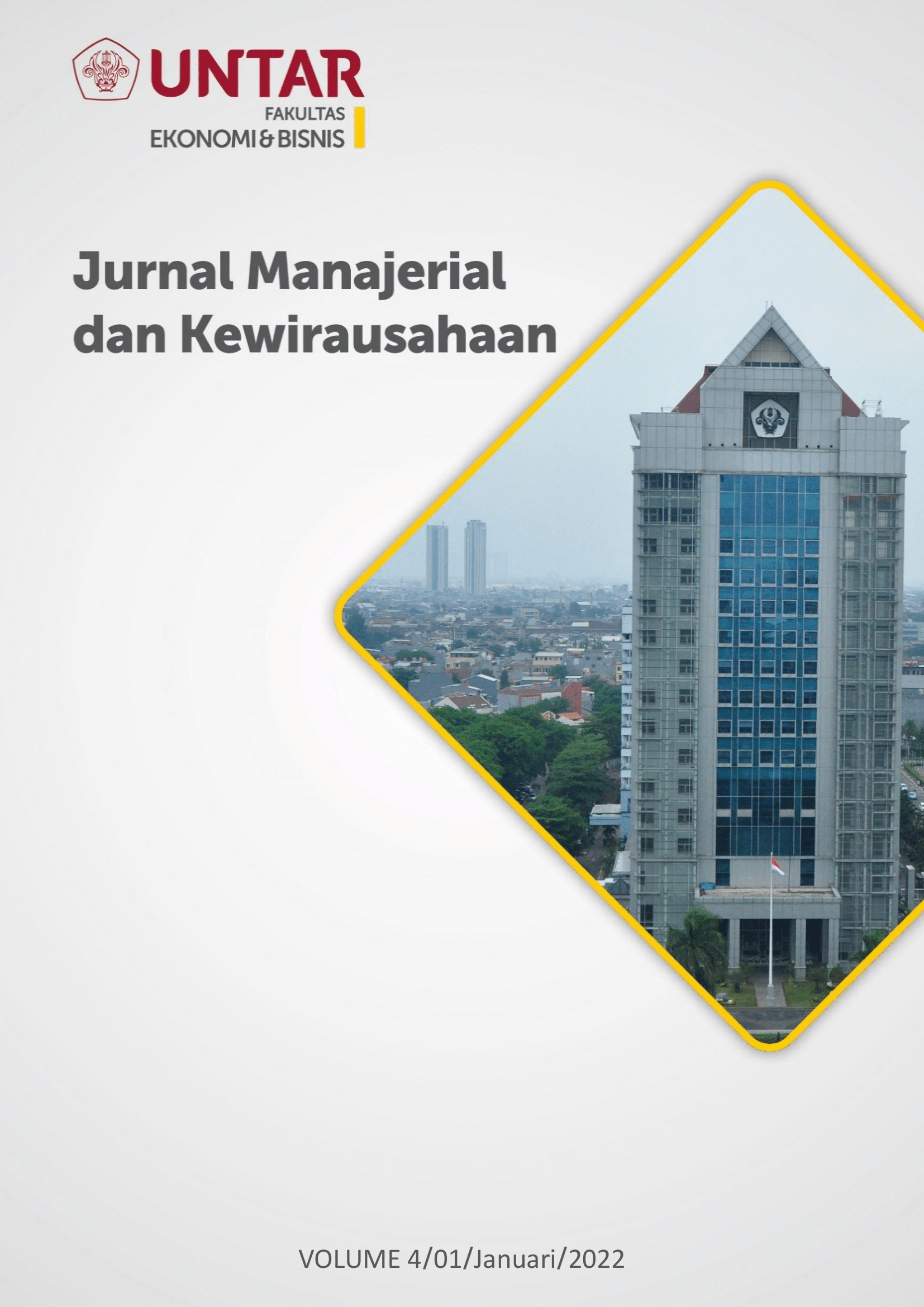Pengaruh Financial Knowledge, Financial Attitude, dan Financial Risk Tolerance terhadap Financial Satisfaction
Main Article Content
Abstract
Tujuan dari penelitian ini adalah untuk menguji pengaruh Financial Knowledge, Financial Attitude, dan Financial Risk Tolerance terhadap Financial Satisfaction. Sampel pada penelitian ini adalah pengguna fintech yang sudah memiliki pendapatan di Jakarta. Sampel dipilih dengan metode convenience sampling yang berjumlah 174 responden dengan menyebarkan kuesioner online. Teknik analisis data yang digunakan adalah structural equation modeling yang dibantu dengan bantuan program SmartPLS.3.2.2. Hasil yang didapat pada penelitian ini menunjukkan bahwa terdapat pengaruh positif Financial Knowledge dan Financial Attitude terhadap Financial Satisfaction. Sedangkan Financial Risk Tolerance tidak memiliki pengaruh terhadap Financial Satisfaciton.
The purpose of this research is to analyze the influence of Financial Knowledge, Financial Attitude, and Financial Risk Tolerance toward Financial Satisfaction. The subjects of this research are fintech users who already have income in Jakarta. Sample was selected using convenience sampling method amounted to 174 respondents through spreading questionnaire online. Data processing techniques using structural equation modeling what helped by SmartPLS.3.2.2 program. The result of this study reveals that Financial Knowledge and Financial Attitude have effects toward Financial Satisfaction, meanwhile Financial Risk Tolerance do not have effects toward Financial Satisfaction.
Article Details
Section
This work is licensed under a Jurnal Muara Ilmu Ekonomi dan Bisnis Creative Commons Attribution-ShareAlike 4.0 International License.,/p>
References
Achjari, D. (2004). Partial Least Square: Another Method of Structural Equation Modeling Analysis. Jurnal Ekonomi dan Bisnis Indonesia, Vol. 19 No. 3, 238-248.
Ajzen, I. (1991). The Theory of Planned Behavior. Organizational Behavior and Human Decision Process, Vol. 50, 197-211.
Ali, e. a. (2019). Influence of Life Events on the Financial Satisfaction of Individuals. IBT Journal of Business Studies, Vol. 15 (1), 123-137.
Ali, e. a. (2020). Financial Satisfaction of International Students in Malaysia. Sarhad Journal of Management Sciences (SJMS), Vol. 6(Issue 1), 49-68.
Arifin, A. (2018). Influence Factors toward Financial Satisfaction with Financial Behavior as Intervening Variable on Jakarta Area Workforce. Europan Research Studies Journal, Vol. XXI(Issue 1), 90-103.
Armilia, N. &. (2020). Faktor yang Mempengaruhi Kepuasan Keuangan Pengguna Financial Technology di Surabaya. Jurnal Ilmu Manajemen, vol. 8 No. 1, 39-50.
Baek, H. K. (2019). Financial Attitude, Knowledge, Investment Behavior and Satisfaction Among the Clients of Comprehensive Financial Planning Services. Financial Planning Research Journal, 11-28.
Caronge, e. a. (2019). Effects of Financial Attitudes, Financial Behavior and Financial Literacy to Financial Satisfaction in Women Workers (Case Study of Female Lecturer at Andi Djemma Palopo University). International Conference on Accounting Management and Economics.
Co?kuner, S. (2016). Understanding Factors Affecting Financial Satisfaction: The Influence of Financial Behavior, Financial Knowledge and Demographics. Imperial Journal of Interdisciplinary Research (IJIR), Vol. 2(Issue 5), 377-385.
Dowling, N. A. (2009). Financial Management Practices and Money Attitudes as Determinants of Financial Problems and Dissastisfaction in Young Male Australian Workers. Association for Financial Counseling and Planning Education, Vol. 20(Issue 2), 5-13.
Garson, G. D. (2016). Partial Least Squares: Regression & Structural Equation Models. Statistical Associates Publishing.
Grable, J. E. (2004). Environmental and Biopsychosocial Factors Associated with Financial Risk Tolerance. Association for Financial Counseling and Planning Education, Vol. 15 (1), 73-82.
Halim, Y. K. (2015). Financial Stressors, Financial Behavior, Risk Tolerance, Financial Solvency, Financial Knowledge, dan Kepuasan Finansial. FINESTA, Vol. 3 No. 1, 19-23.
Hira, T. K. (1998). Predictors of Financial Satisfaction: Differences Between Retirees and Non-retirees. Association of Financial Counseling and Planning Education, Vol. 9 (2), 75-84.
Jeong, W. &. (2004). Risk Tolerance and Financial Satisfaction. International Journal of Human Ecology, Vol. 5 No. 1, 35-43.
Joo, S. &. (2004). An Exploratory Framework of Determinants of Financial Satisfaction. Journal of Family and Economic Issues, Vol. 25 (1), 25-50.
Kirbis, I. S. (2017). Reliationship Between Financial Satisfaction and Financial Literacy: Exploring Gender Differences. Zagreb School of Economics and Management, 165-185.
Ozili, P. K. (2018). Impact of Digital Finance on Financial Inclusion and Stability. Borsa Istanbul Review, Vol. 18-4, 329-340.
Paluri, R. A. (2016). Financial Attitude Based Segmentation of Women in India: An Exploratory Study. International Journal of Bank Marketing, Vol. 34 No. 5, 670-689.
Parrotta, J. L. (1998). The Impact of Financial Attitudes and Knowledge on Financial Management and Satisfaction of Recently Married Individuals. Financial Counseling and Planning Education, Vol. 9 (2), 59-75.
Rai, K. D. (2019). Association of Financial Attitude, Financial Behavior and Financial Knowledge Towards Financial Literacy: A structural Equation Modeling Approach. FIIB Business Review, Vol. 8 (1), 51-60.
Robb, C. A. (2012). The Demand for Financial Professionals' advice: The Role of Financial Knowledge, Satisfaction, and Confidence. Financial Service Review, 291-305.
Rusdini, D. A. (2021). Faktor yang Mempengaruhi Financial Satisfaction Pada Masyarakat Kabupaten Pamekasan. Jurnal Ilmu Manajemen, Vol. 9 No. 1.
Saurabh, K. &. (2018). Role of Financial Risk Attitude and Financial Behavior as Mediators in Financial Satisfaction Empirical Evidence From India. South Asian Journal of Business Studies, Vol. 7 No. 2, 207-224.
Saurabh, K. &. (2019). Role of Financial Knowledge, Financial Socialization and Financial Risk Attitude in Financial Satisfactionof Indian Individuals. International Journal Indian Culture and Business Management, Vol. 18 No. 1, 104-122.
Sawitri, e. a. (2018). Behavior in Managing Revenue to Achieve Financial Satisfaction. Blibioteca Digital Repositorio Académico, 2477-9385.
Sherlyani, M. &. (2020). Pengaruh Financial Behavior, Risk Tolerance, Financial Strain Terhadap Financial Satisfaction. Jurnal Manajerial dan Kewirausahaan, Vol. II No. 1, 272-281.
Sulaiman, E. K. (2012). An Empirical Analysis of Financial Risk Tolerance and Demographic Features of Individual Investor. Procedia Economics and Finance 2, 109-115.
Wijaya, O. S. (2020). Pengaruh Financial Attitude, Financial Behavior, Financial Knowledge dan Risk Tolerance Terhadap Financial Satisfaction. Jurnal Manajerial dan Kewirausahaan, Vol. II No. 3, 631-642.
Wingdes, I. (2019). Pemanfaatan SEM PLS untuk Penelitian. Seminar Nasional Hasil Pengabdian Kepada Masyarakat (SINDIMAS), 43-48.
Yahaya, e. a. (2019). The Effect of Financial Knowledge, Financial Attitudes on Financial Behavior among University Students. International Journal of Academic Research in Business and Social Sciences, Vol. 9 No. 8, 23-32.
Yap, e. a. (2016). The Effect of Financial Literacy and Attitude on Financial Management Behavior and Satisfaction. International Journal of Administrative Science & Organization, Vol. 23 No. 3, 140-146.

